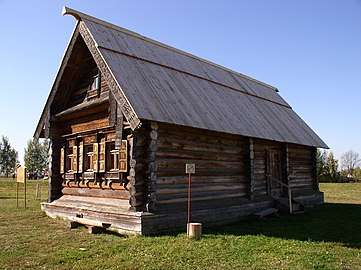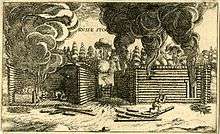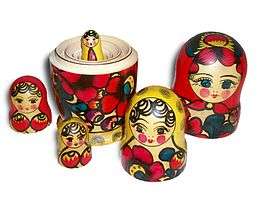Izba
An izba (Russian: изба́, IPA: [ɪzˈba] (![]()


The dominant building material of Russian vernacular architecture, and material culture generally, for centuries was wood. Specifically houses were made from locally-cut rough-hewn logs, with little or no stone, metal, or glass. Even churches and urban buildings were primarily wooden until the eighteenth century.[1]
All of the building's components were simply cut and fitted together using a hand axe. Coins, wool, and frankincense were customarily placed beneath the corners of the house as an expression of the superstition that doing this would make the people living there healthy and wealthy.
From the fifteenth century on, the central element of the interior of izba was the Russian stove, which could occupy up to one quarter of the floorspace in smaller dwellings. Often there were no beds (in the Western sense) for many members of the household, as people would sleep directly on the plaster top of the oven, or on shelves built directly above the stove.[2]
The outside of izbas was often embellished by various special architectural features, for example the rich wood carving decoration of windows. Such decorative elements and the use of the Russian stove are still commonly found in many modern Russian countryside houses, even though only the older wooden houses are called izbas today.
An alternative word for "izba" in Russian is "khata" (хата), which is the word in most Slavic languages for any cottage or small house (including Belarusian and Ukrainian). According to historian of Russia Geoffrey Hosking, starting in the eighteenth century khata was used in to refer to cottages on the tree-poor southern steppes which used logs only for the framing, and then used wattle-and-daub as infill covered with a plaster and whitewash exterior.[2] However, generally this wattle-and-daub house is called "mazanka" (мазанка) and khata is not necessarily a mazanka.
"Izba" is also the Bulgarian and Croatian word for "cellar", as in wine cellar or a basement used for storing foodstuffs treated to last a long time in general. In several other Slavic languages, izba is a generic term for a room inside a house (the term is used specifically for habitable rooms).
References
- Hosking, 7
- Hosking, 8

